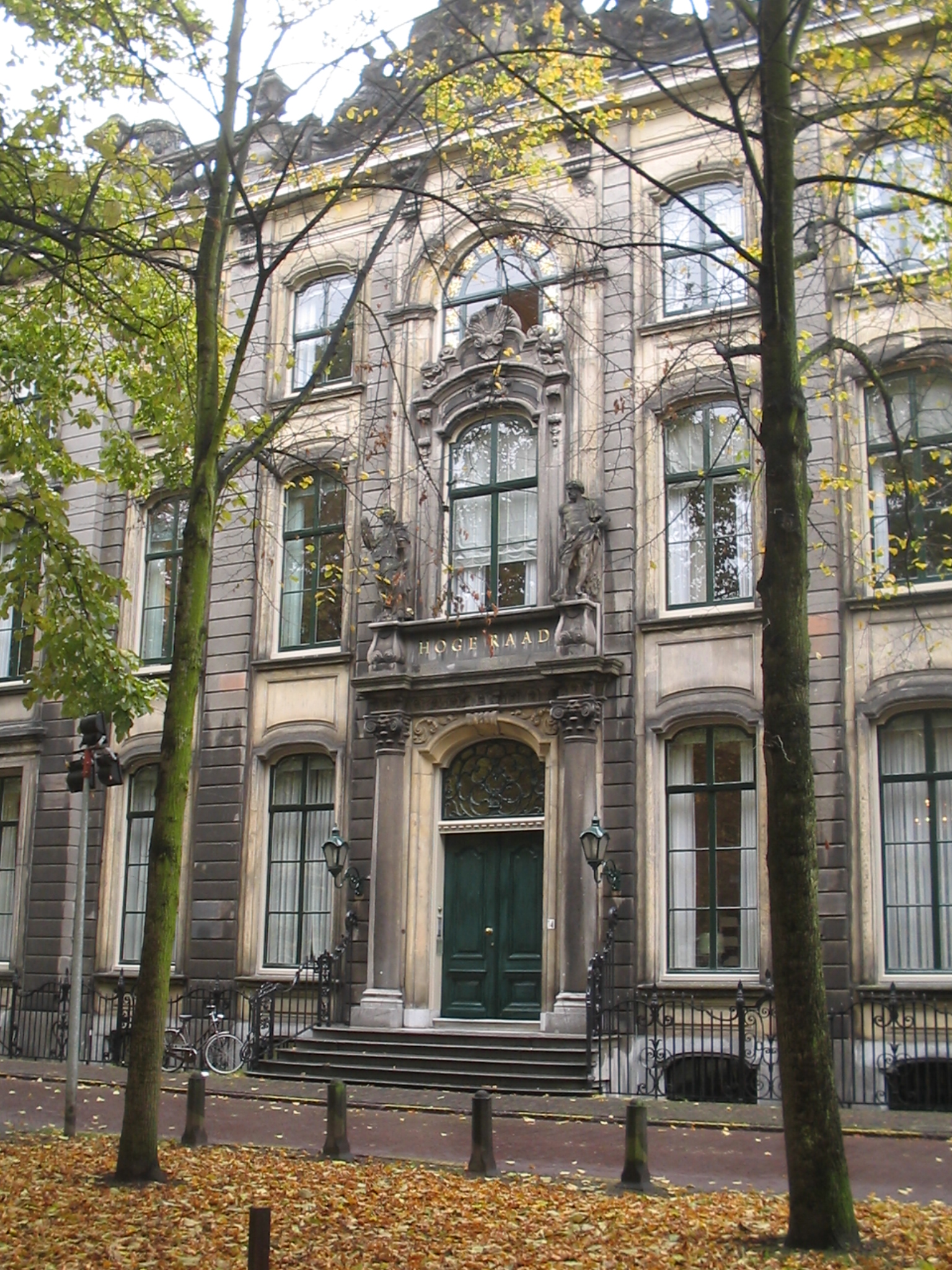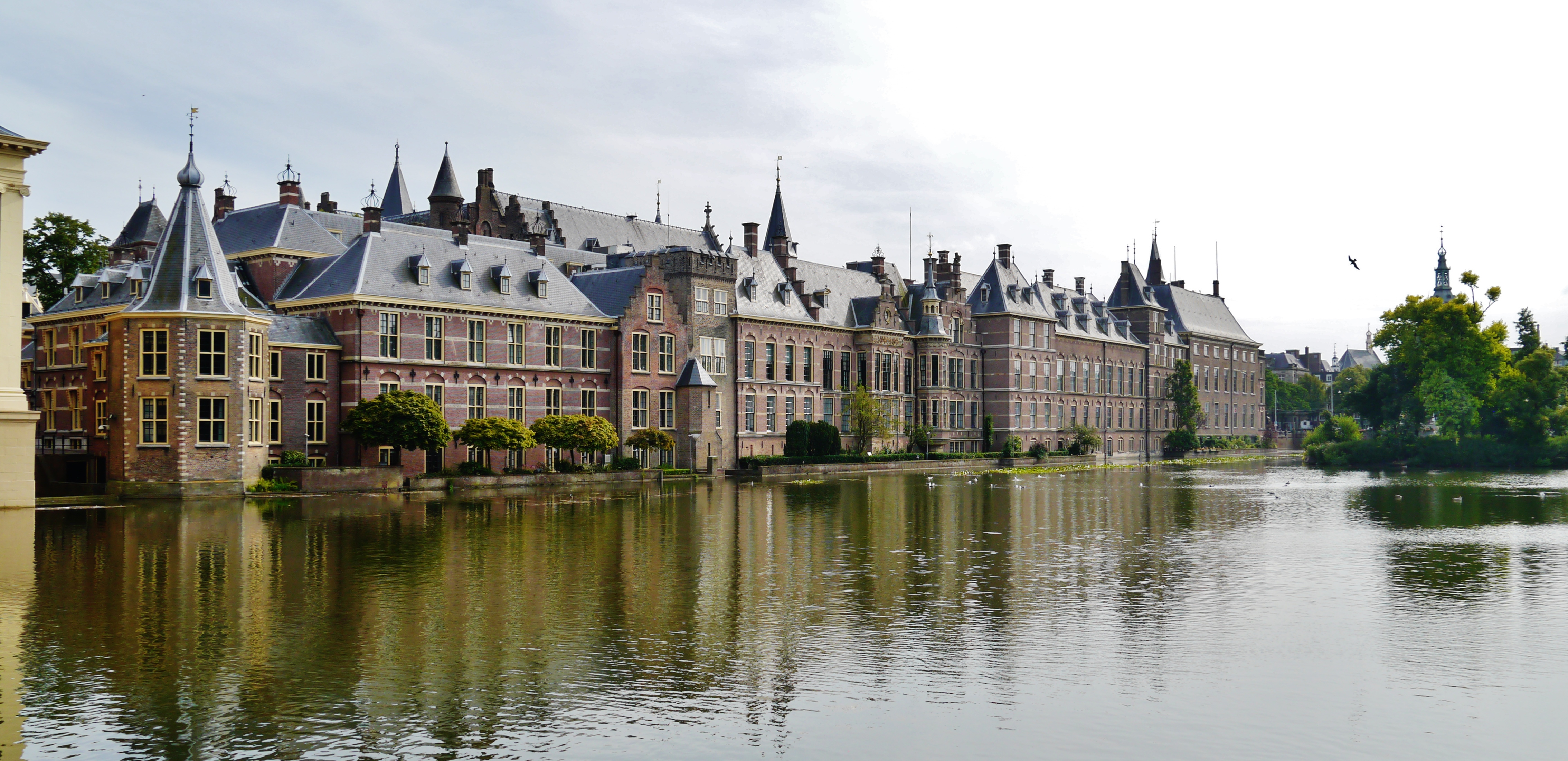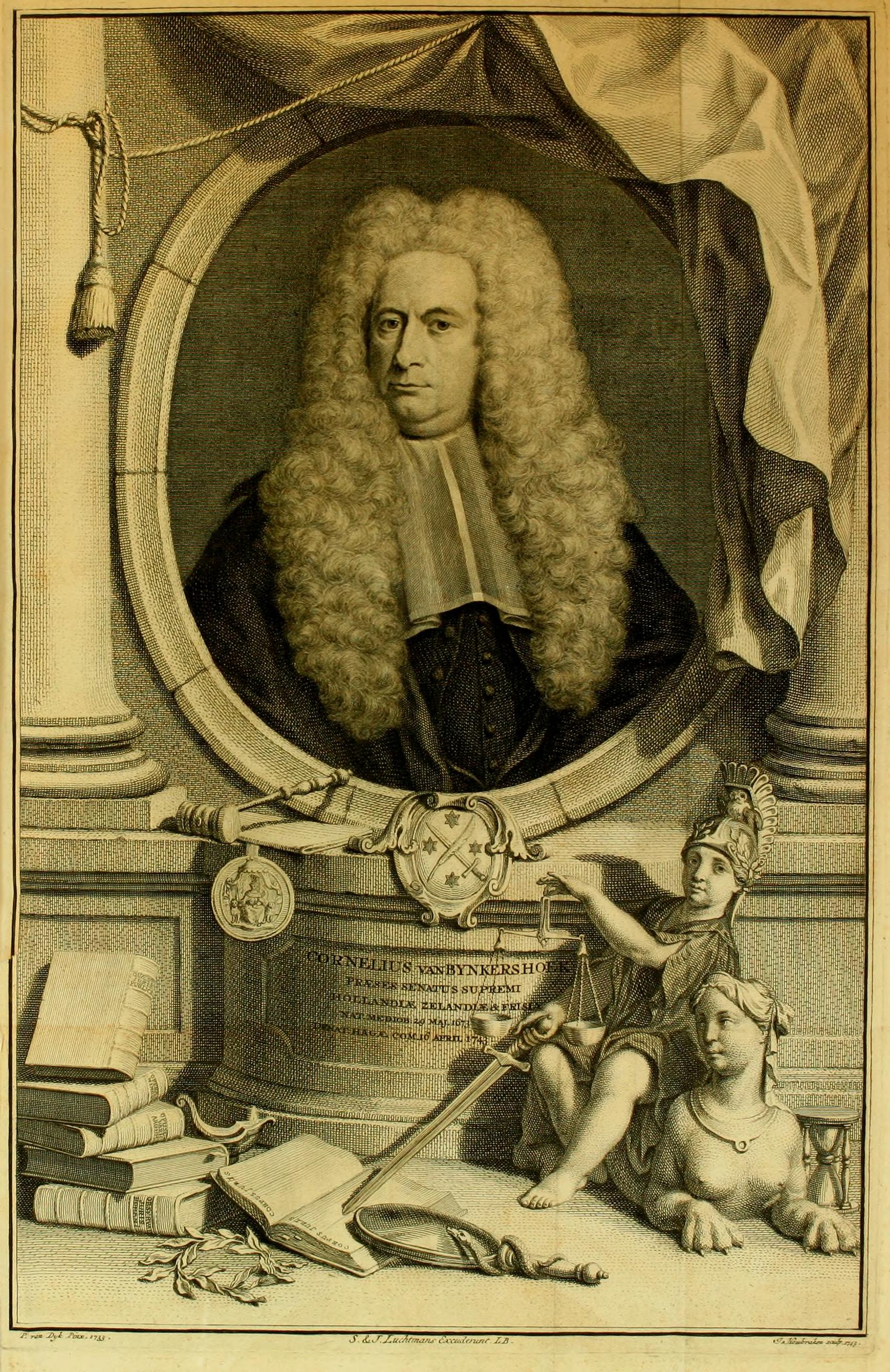|
Hoge Raad
The Supreme Court of the Netherlands ( nl, Hoge Raad der Nederlanden or simply ''Hoge Raad''), officially the High Council of the Netherlands, is the final court of appeal in civil, criminal and tax cases in the Netherlands, including Curaçao, Sint Maarten and Aruba. The Court was established on 1 October 1838 and is located in The Hague. The Supreme Court rules civil and criminal matters. In certain administrative cases it has final jurisdiction as well, while in other cases this jurisdiction rests with the adjudicative division of the Council of State (''Raad van State''), the Central Appeals Tribunal ('), the Trade and Industry Appeals Tribunal (') as well as judicial institutions in the Caribbean part of the Kingdom of the Netherlands. The Court is a court of cassation, which means that it has the competence to quash or affirm rulings of lower courts, but no competence to re-examine or question the facts. It only considers whether the lower courts applied the law correct ... [...More Info...] [...Related Items...] OR: [Wikipedia] [Google] [Baidu] |
Netherlands
) , anthem = ( en, "William of Nassau") , image_map = , map_caption = , subdivision_type = Sovereign state , subdivision_name = Kingdom of the Netherlands , established_title = Before independence , established_date = Spanish Netherlands , established_title2 = Act of Abjuration , established_date2 = 26 July 1581 , established_title3 = Peace of Münster , established_date3 = 30 January 1648 , established_title4 = Kingdom established , established_date4 = 16 March 1815 , established_title5 = Liberation Day (Netherlands), Liberation Day , established_date5 = 5 May 1945 , established_title6 = Charter for the Kingdom of the Netherlands, Kingdom Charter , established_date6 = 15 December 1954 , established_title7 = Dissolution of the Netherlands Antilles, Caribbean reorganisation , established_date7 = 10 October 2010 , official_languages = Dutch language, Dutch , languages_type = Regional languages , languages_sub = yes , languages = , languages2_type = Reco ... [...More Info...] [...Related Items...] OR: [Wikipedia] [Google] [Baidu] |
Case Law
Case law, also used interchangeably with common law, is law that is based on precedents, that is the judicial decisions from previous cases, rather than law based on constitutions, statutes, or regulations. Case law uses the detailed facts of a legal case that have been resolved by courts or similar tribunals. These past decisions are called "case law", or precedent. ''Stare decisis''—a Latin phrase meaning "let the decision stand"—is the principle by which judges are bound to such past decisions, drawing on established judicial authority to formulate their positions. These judicial interpretations are distinguished from statutory law, which are codes enacted by legislative bodies, and regulatory law, which are established by executive agencies based on statutes. In some jurisdictions, case law can be applied to ongoing adjudication; for example, criminal proceedings or family law. In common law countries (including the United Kingdom, United States, Canada, Australia and Ne ... [...More Info...] [...Related Items...] OR: [Wikipedia] [Google] [Baidu] |
Binnenhof
The Binnenhof (; en, Inner Court) is a complex of buildings in the city centre of The Hague, Netherlands, next to the Hofvijver lake. It houses the meeting place of both houses of the States General of the Netherlands, as well as the Ministry of General Affairs and the office of the Prime Minister of the Netherlands. Built primarily in the 13th century, the Gothic castle originally functioned as residence of the counts of Holland and became the political centre of the Dutch Republic in 1584. It is counted among the Top 100 Dutch heritage sites. The Binnenhof is among the oldest Parliament buildings in the world still in use. History Little is known about the origin of the Binnenhof. Presumably, the grounds next to the Hofvijver lake, and the small homestead on it, were purchased by Count Floris IV of Holland from Meiland van Wassenaar in November 1229. Between 1230 and 1234 he had the homestead expanded to a small keep. After Floris' son and successor William II was cr ... [...More Info...] [...Related Items...] OR: [Wikipedia] [Google] [Baidu] |
Nijmegen
Nijmegen (;; Spanish and it, Nimega. Nijmeegs: ''Nimwèège'' ) is the largest city in the Dutch province of Gelderland and tenth largest of the Netherlands as a whole, located on the Waal river close to the German border. It is about 60 km south east of Utrecht and 50 km north east of Eindhoven. Nijmegen is the oldest city in the Netherlands, the second to be recognized as such in Roman times, and in 2005 celebrated 2,000 years of existence. Nijmegen became a free imperial city in 1230 and in 1402 a Hanseatic city. Since 1923 it has been a university city with the opening of a Catholic institution now known as the Radboud University Nijmegen. The city is well known for the International Four Days Marches Nijmegen event. Its population in 2022 was 179,000; the municipality is part of the Arnhem–Nijmegen metropolitan area, with 736,107 inhabitants in 2011. Population centres The municipality is formed by the city of Nijmegen, incorporating the former villages of Ha ... [...More Info...] [...Related Items...] OR: [Wikipedia] [Google] [Baidu] |
Second World War
World War II or the Second World War, often abbreviated as WWII or WW2, was a world war that lasted from 1939 to 1945. It involved the vast majority of the world's countries—including all of the great powers—forming two opposing military alliances: the Allies and the Axis powers. World War II was a total war that directly involved more than 100 million personnel from more than 30 countries. The major participants in the war threw their entire economic, industrial, and scientific capabilities behind the war effort, blurring the distinction between civilian and military resources. Aircraft played a major role in the conflict, enabling the strategic bombing of population centres and deploying the only two nuclear weapons ever used in war. World War II was by far the deadliest conflict in human history; it resulted in 70 to 85 million fatalities, mostly among civilians. Tens of millions died due to genocides (including the Holocaust), starvation, ma ... [...More Info...] [...Related Items...] OR: [Wikipedia] [Google] [Baidu] |
Aryan Race
The Aryan race is an obsolete historical race concept that emerged in the late-19th century to describe people of Proto-Indo-European heritage as a racial grouping. The terminology derives from the historical usage of Aryan, used by modern Indo-Iranians as an epithet of "noble". Anthropological, historical, and archaeological evidence does not support the validity of this concept.Arvidsson 2006:298 Arvidsson, Stefan (2006), Aryan Idols: Indo-European Mythology as Ideology and Science, translated by Sonia Wichmann, Chicago and London: The University of Chicago Press. The concept derives from the notion that the original speakers of the Proto-Indo-European language were distinct progenitors of a superior specimen of humankind, and that their descendants up to the present day constitute either a distinctive race or a sub-race of the Caucasian race, alongside the Semitic race and the Hamitic race. This taxonomic approach to categorizing human population groups is now conside ... [...More Info...] [...Related Items...] OR: [Wikipedia] [Google] [Baidu] |
Hoge Raad Van Holland En Zeeland
The Hoge Raad van Holland, Zeeland en West-Friesland (; usually translated in the literature as "High Court of Holland and Zeeland," though "Supreme Court" may better designate its function, and the literal translation is: "High ''Council'' of Holland and Zeeland") was the supreme court of the provinces of Holland and Zeeland in the Dutch Republic in the period 1582-1795. This court is considered a direct predecessor of the current ''Hoge Raad der Nederlanden'' (Supreme Court of the Netherlands). It played an important role in the formation of Roman-Dutch law, which still influences law in Southern Africa, through its jurisprudence. History The Great Council of Mechelen was the final Court of Appeal in the Habsburg Netherlands for all provincial High Courts. When, however, the rebellious provinces of Holland and Zeeland became physically separated from this court due to the difficulties for travellers during the military campaigns of the early Eighty Years' War after 1572, the prac ... [...More Info...] [...Related Items...] OR: [Wikipedia] [Google] [Baidu] |
Great Council Of Mechelen
From the 15th century onwards, the Great Council of the Netherlands at Mechelen (Dutch: ''De Grote Raad der Nederlanden te Mechelen''; French: ''le grand conseil des Pays-Bas à Malines''; German: ''der Grosse Rat der Niederlände zu Mecheln'') was the highest court in the Burgundian Netherlands. It was responsible for the Dutch-, French- and German-speaking areas. In Luxembourgish the phrase ''"mir ginn op Mechelen"'' (we'll go to Mechelen) still means playing one's last trump card. The Grote Raad first sat in the Schepenhuis in Mechelen then, from 1616, in the (old) palace of Margaretha of Austria on Keizerstraat. Origins and history The medieval rulers were assisted by advisers. Together with the ruler they formed the Council of State, also called the ''consilium'' or ''curia''. Gradually the council became more specialised, with separate financial, judicial and political council emerging. In the Burgundian Netherlands, the councils initially travelled with the Duke. In 147 ... [...More Info...] [...Related Items...] OR: [Wikipedia] [Google] [Baidu] |
Batavian Revolution
The Batavian Revolution ( nl, De Bataafse Revolutie) was a time of political, social and cultural turmoil at the end of the 18th century that marked the end of the Dutch Republic and saw the proclamation of the Batavian Republic. The period of Dutch history that followed the revolution is referred to as the "Batavian-French era" (1795–1813) even though the time spanned was only 20 years, of which three were under French occupation under Napoleon Bonaparte. Background By the end of the 18th century, the Netherlands found themselves in a deep economic crisis, caused by the devastating Fourth Anglo-Dutch War. During this time, the banks of the Dutch Republic held much of the world's capital. The government-sponsored banks owned up to 40% of Great Britain's national debt. The people of the Netherlands grew increasingly discontent with the authoritarian regime of the stadtholder, William V. This concentration of wealth led to the formation of the Dutch Patriots by a minor Dutc ... [...More Info...] [...Related Items...] OR: [Wikipedia] [Google] [Baidu] |
French People
The French people (french: Français) are an ethnic group and nation primarily located in Western Europe that share a common French culture, history, and language, identified with the country of France. The French people, especially the native speakers of langues d'oïl from northern and central France, are primarily the descendants of Gauls (including the Belgae) and Romans (or Gallo-Romans, western European Celtic and Italic peoples), as well as Germanic peoples such as the Franks, the Visigoths, the Suebi and the Burgundians who settled in Gaul from east of the Rhine after the fall of the Roman Empire, as well as various later waves of lower-level irregular migration that have continued to the present day. The Norse also settled in Normandy in the 10th century and contributed significantly to the ancestry of the Normans. Furthermore, regional ethnic minorities also exist within France that have distinct lineages, languages and cultures such as Bretons in Brittany, Occi ... [...More Info...] [...Related Items...] OR: [Wikipedia] [Google] [Baidu] |
Hoge Raad Gebouw Lange Voorhout
Hoge may refer to: People Surname * Dean Hoge (1937–2008), American sociologist * Enos D. Hoge (1831-1916), American judge, lawyer, and territorial legislator * James F. Hoge, Jr. (born 1935), American foreign Policy expert * Jane Currie Blaikie Hoge (1811–1890), American civil rights activist * John Hoge, (1760–1824) American politician from Pennsylvania * John B. Hoge (1825–1896), American politician from West Virginia * Joseph P. Hoge (1810–1891), American politician * Matthew Ryan Hoge (born 1974), American writer * Merril Hoge (born 1965), American football player * Solomon L. Hoge (1836–1909), American politician * Tristen Hoge (born 1997), American football player * Warren Hoge (born 1941), American journalist * Will Hoge (born 1972), American musician * William Hoge (other) Nickname *Hoge Workman (1899–1972), American baseball player Other uses * Hoge, Kansas, United States * Hoge Building, in Seattle Washington, United States * Hover out o ... [...More Info...] [...Related Items...] OR: [Wikipedia] [Google] [Baidu] |
Judicial Review
Judicial review is a process under which executive, legislative and administrative actions are subject to review by the judiciary. A court with authority for judicial review may invalidate laws, acts and governmental actions that are incompatible with a higher authority: an executive decision may be invalidated for being unlawful or a statute may be invalidated for violating the terms of a constitution. Judicial review is one of the checks and balances in the separation of powers: the power of the judiciary to supervise the legislative and executive branches when the latter exceed their authority. The doctrine varies between jurisdictions, so the procedure and scope of judicial review may differ between and within countries. General principles Judicial review can be understood in the context of two distinct—but parallel—legal systems, civil law and common law, and also by two distinct theories of democracy regarding the manner in which government should be organized w ... [...More Info...] [...Related Items...] OR: [Wikipedia] [Google] [Baidu] |




.jpg)



.jpg)